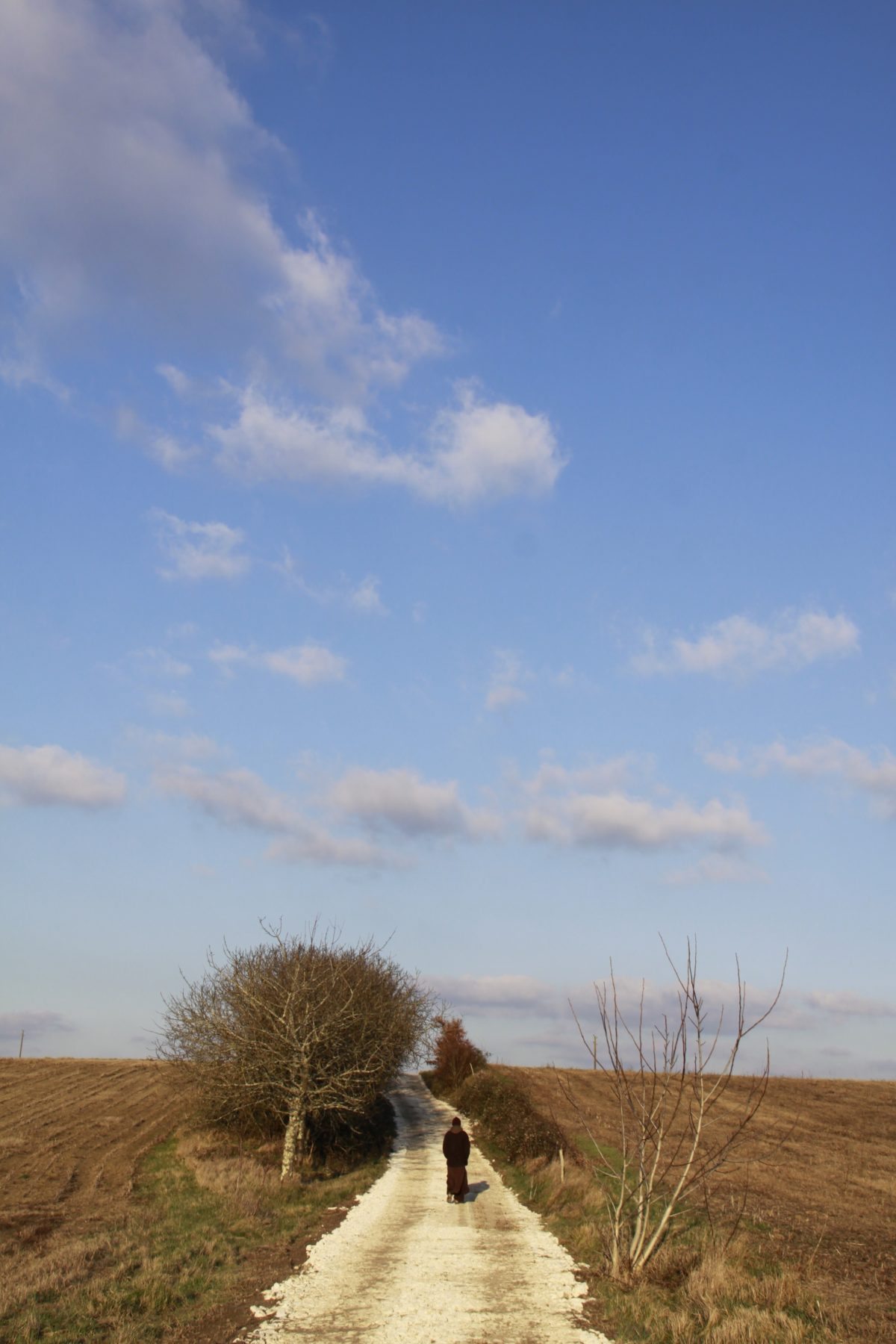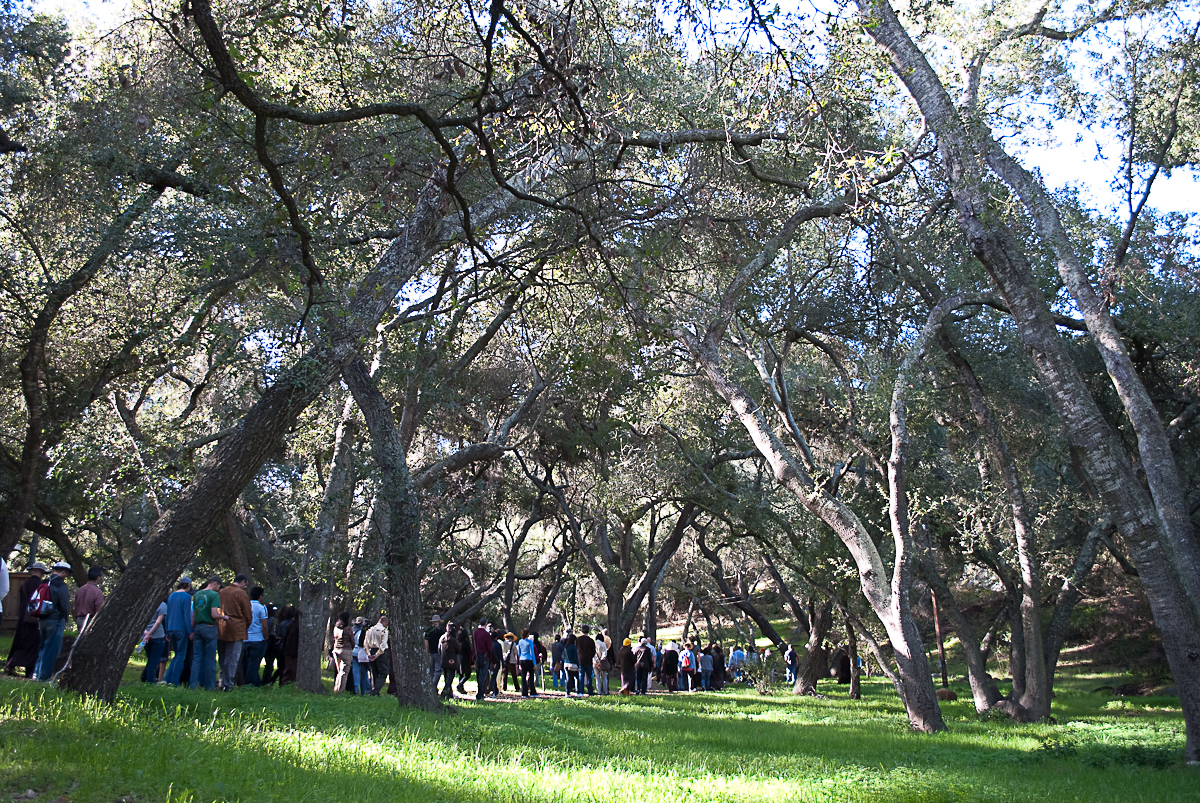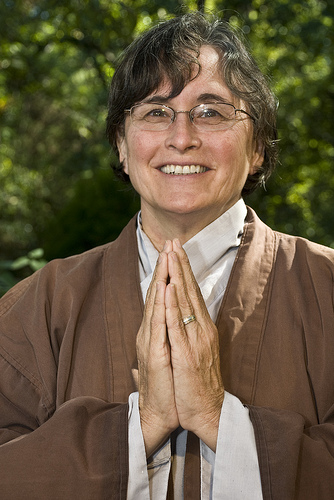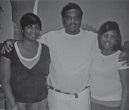By Leslie Rawls and Carl Dunlap, Jr.

To our respected and beloved teacher, Thay Nhat Hanh, and to the stream of ancestral teachers who have preserved and transmitted the teachings, we offer an ocean of gratitude.
From Carl
December 5, 1988 was the coldest, darkest day of my entire life. I committed the vile act of murder and was eventually sentenced to life in prison.
By Leslie Rawls and Carl Dunlap, Jr.

To our respected and beloved teacher, Thay Nhat Hanh, and to the stream of ancestral teachers who have preserved and transmitted the teachings, we offer an ocean of gratitude.
From Carl
December 5, 1988 was the coldest, darkest day of my entire life. I committed the vile act of murder and was eventually sentenced to life in prison. Taking a life never resonated well in my heart at all. Because I was raised a Baptist Christian, I knew that for forgiveness, I had to sincerely repent and draw closer to God. However, during my Christian experience, something didn’t feel complete. I began asking questions. Why are we the only ones that will be saved when this God comes back and destroys the entire earth? You mean to tell me that this great loving Creator gave us life and is now saying if you don’t believe in a certain way, he is going to destroy us and torture us in a burning hell forever? It sounded absurd. So I found the confidence to explore other ways of life and tried to find peace in my heart, while being someone who could make a positive effect on life.
That’s when I met a guy named Daniel, sitting outside, meditating. He looked so peaceful and serene. Several days went by, and I could not forget that look or the feeling I experienced when I encountered Daniel. I eventually approached Daniel and asked him what he studied and what his way of life was. He said Buddhism, and that he was in the process of trying to get a Sangha started here at Piedmont Correctional. I didn’t know what in the world he was talking about and asked if he had any information that would explain. He said, “I have a book that I want you to read. Read it and get back with me.”
The name of that book was Being Peace by Thich Nhat Hanh. The book was incredible. Thay offered so many precious jewels of wisdom that were simple and liberating. I knew this was what I wanted to do. What really sold me is the fact that Thich Nhat Hanh says that his teachings are not to fight, kill, or die for. They are only a way to develop understanding and compassion. Thich Nhat Hanh says if his teachings are for you, then use them, and if they are not, then abandon them. Man, what humility, style, and grace.
After reading Being Peace, I asked Daniel how could I be a part of this Sangha and be filled with the teachings of liberation. Daniel said, “Next week we will be starting a Sangha here and Leslie will be coming in to teach.” I went to the meeting and was absolutely amazed at Leslie’s composure and sincere compassion about humanity. I wanted to cultivate that in my life and be a solution to suffering and be helpful as well as compassionate to every being I encountered.
After attending meetings for a little over a year, I received the Five Mindfulness Trainings in a beautiful transmission ceremony. The transmission was very important to me. My family, friends, and peers noticed a very big change in my life and I owe it all to the practice. Being in the practice taught me to be mindful in all my actions, to be aware in each living moment. Because I practice, people see me as someone who strives to relieve suffering in myself and others.
Never in my wildest dreams could I imagine the effects of being mindful about how I ate, breathed, walked, sat, or lay down. It is an awe-inspiring experience. Now my daily life, as I practice, is filled with being aware and staying in the present moment, never worrying, just trying to be present, and taking care of each moment as situations arise.
In this dog-eat-dog world, people are motivated by many different things, which leads them to be suspicious of true kindness. For example, my job assignment here is commissary clerk in the kitchen. The job only requires for me to pass out food, be prepared for that day, and keep inventory on the stock. Well, one day, I noticed a big pile of pots and pans heaped around the sink.
My mind immediately went back to something Thich Nhat Hanh had said: “When we wash dishes, we are aware that we are washing dishes.” I said to myself, “What a perfect time to practice being in the present moment and be aware that I am washing dishes.” I poured myself into it and experienced the beauty of being there and taking my time to wash every pot and pan there, and the ones that continued to come.
About an hour and a half went by and the guy assigned to washing dishes came back, expecting to walk into a big load of work. To his surprise, everything was caught up and clean. He asked, “Which supervisor told you to do that?” I told him nobody asked me to do it and I did it on my own. He then asked, “Well how much do I owe you, because nobody does anything around here for free.” I smiled at him and said, “You don’t owe me anything,” as I walked away. Because for me, as I was there in the present moment, I imagined myself at Plum Village, serving with my brothers and sisters, washing dishes with a big smile on my face.
Aware that words are just labels and they don’t depict who we truly are, I don’t go around with a big sign around my neck saying that I am Buddhist. Therefore, it was quite refreshing to encounter my next experience. One afternoon, an officer approached me and asked me to sit in the infirmary with a man who was dying of cancer. The nurses were understaffed and they needed someone to just sit in the room with him, in case he tried to get up out of bed because he was so weak and he could not walk on his own strength without falling down. While sitting in the infirmary with him, I thought of impermanence. Old age, sickness, and death are certain to come for everyone. Also, I knew it was not a time for words so I just simply sat with him and occasionally, he would smile. When he spoke, I just listened and let him know that I was there for him.
My daily life consists of practicing the principle of dwelling in the present moment and staying mindful of my breath. Throughout the day, I smile and try to handle everything with the correct attitude. I’m not always successful, but just being aware of the process of unwholesome seeds when they are present helps out greatly. My appreciation for the practice is boundless. My teacher, Leslie, is a beautiful person who takes the time to teach me with compassion. I am truly honored, with much humility to be her student and dear brother.

From Leslie
Our Sangha has supported various inmate North Carolina Sanghas for years. For over a decade, the distances kept me from participating more than a few times annually. A few years ago that changed. Daniel, an inmate I knew from a mountain prison, transferred to Piedmont Correctional, about an hour away from me. And Daniel began to build a Sangha. I came only a few times before going to Plum Village to receive Lamp Transmission. When I returned, I was surprised to learn that Daniel had transferred out. But Daniel had started the wheel of practice. Our tiny inmate Sangha now meets every Monday, thanks to Daniel’s initial push, the energy of our practice, and the ongoing support of Chaplain Michael Haynes.
Thirty-nine-year-old Carl has been a Sangha regular since we began. Because he is serving a life sentence and North Carolina has abolished parole, we can expect that he may never be on the outside. Carl has told me that sometimes he wishes he could be outside, so he could visit Plum Village and practice with the Sangha. He also recognizes that his practice is very helpful to people right where he is.
In the years since the Sangha began, Carl’s practice has blossomed. I have seen tension lessen in his face, seen him walking mindfully and peacefully, and heard from those he lives with about how his practice affects others in the prison. One Monday when Chaplain Haynes was out, another staff member oversaw our small group. As we packed away our blankets and inflatable cushions, the staff member commented on how peaceful it had been to sit with us. (He had been across the room, behind a desk, trying to keep his chair from squeaking.) Then, he spoke about Carl, telling me that Carl is a source of peace to other inmates, guards, and staff. He too had seen the strength of Carl’s practice. Other times, I’ve seen Carl listen to Sangha members with a tender heart and respond with words of compassion and understanding. His practice offers a rare and sorely needed balm for troubled hearts.
A regular in our Piedmont Correctional Sangha has asked, more than once, why I come. I have no words to answer, and sometimes tell him, truthfully, that I don’t know. But my heart knows that it’s something like this: I come to the prison every Monday because transformation is possible through these teachings, because everyone matters, and because transformation, like happiness, is not an individual matter.

Leslie Rawls, True Realm of Enlightenment, is a founding member and the Dharma Teacher for the Charlotte, North Carolina Community of Mindfulness. She received Lamp Transmission from Thich Nhat Hanh during the 2008-2009 Winter Retreat in Plum Village. She edited the Mindfulness Bell from 1996 to 2001, and currently serves on the magazine’s Advisory Board.

Carl Dunlap, Boundless Compassionate Heart of the Source, was raised in Winston-Salem, North Carolina. He practices every week with the Extended Charlotte Community of Mindfulness Sangha in Piedmont Correctional Institute. He is the father of two and an aspirant to the Order of Interbeing.

